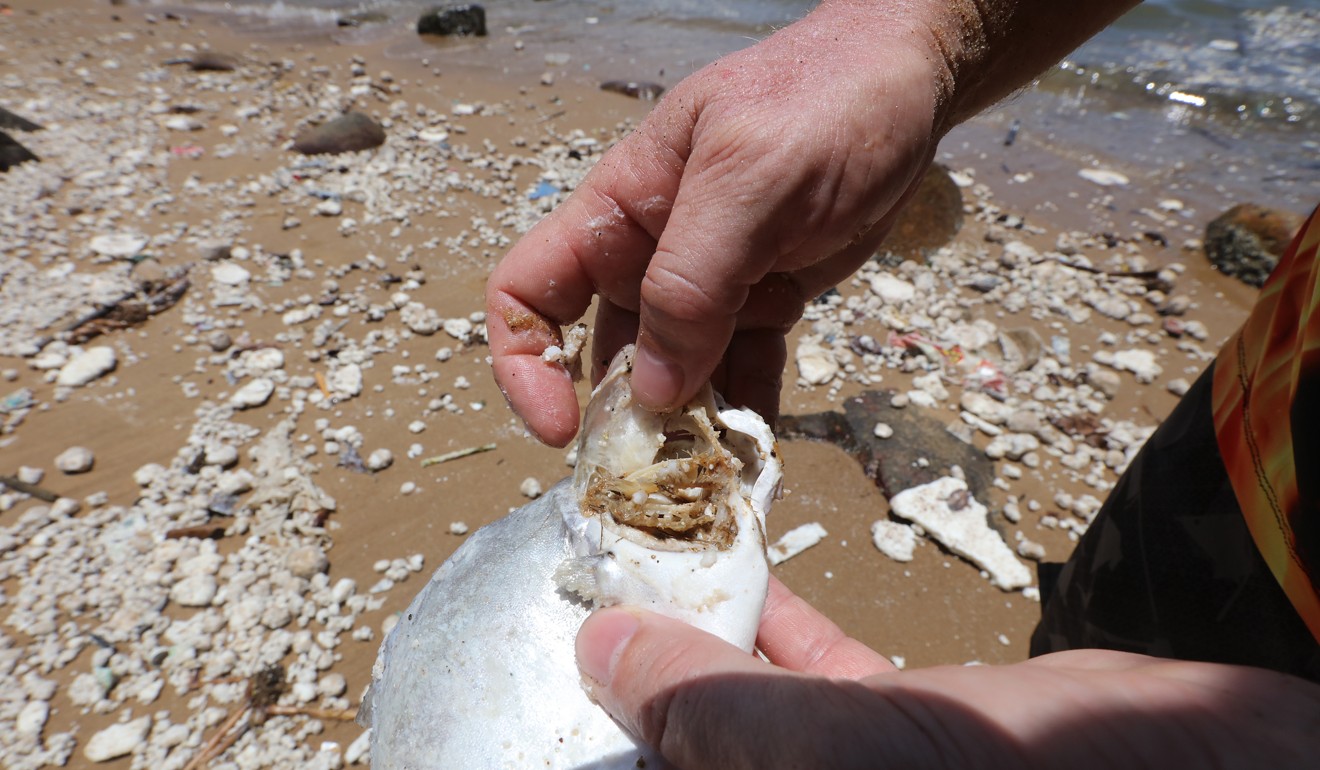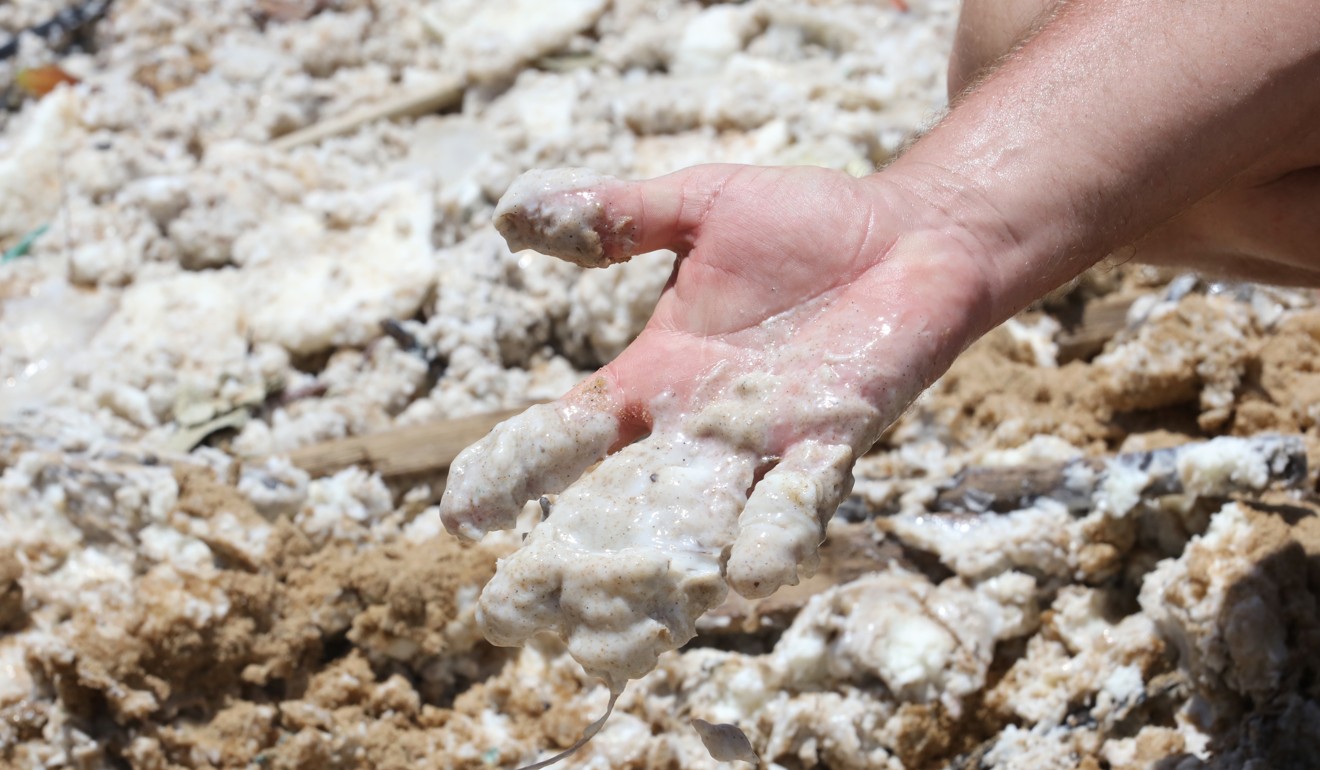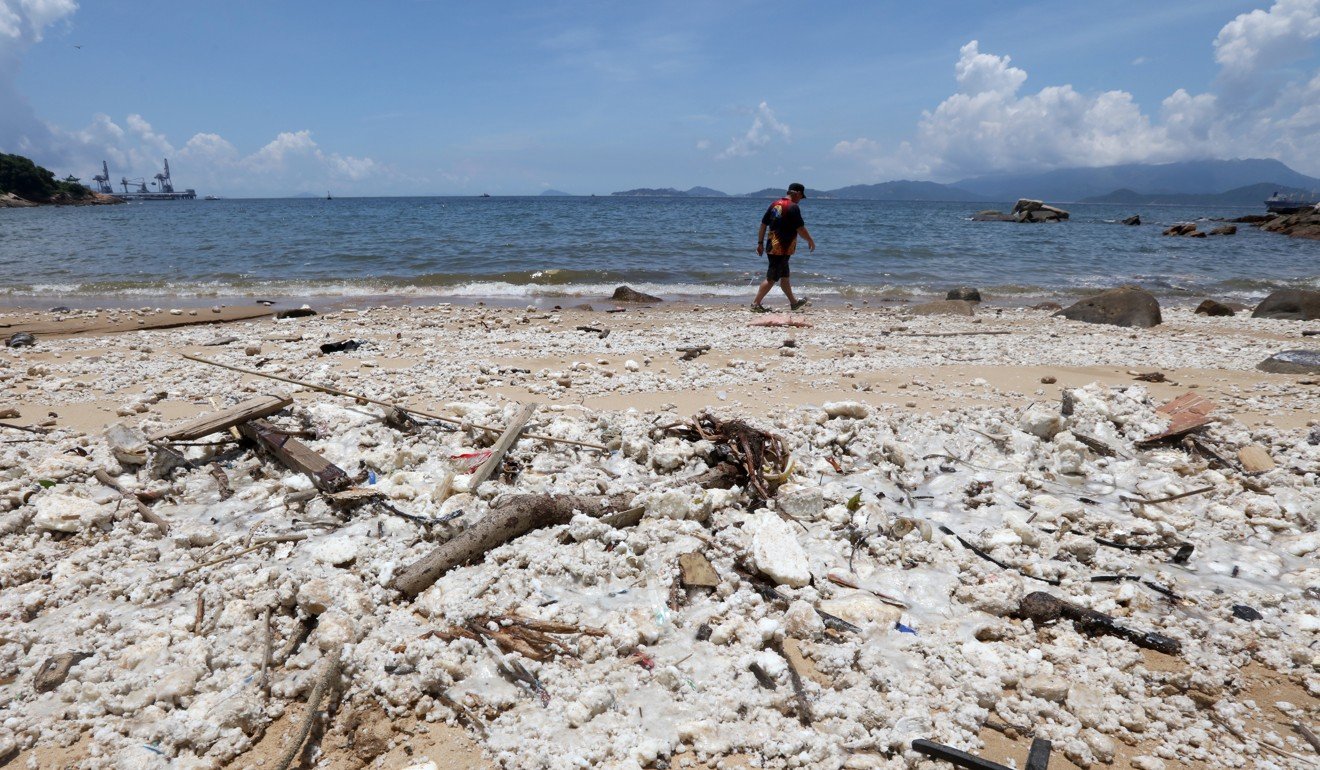
Dog owners warned to beware of spilled palm oil washing up on Hong Kong beaches
A dog was seen eating a dead fish caked in solidified oil on a Lamma beach while one resident says the globs are starting to smell like two-week-old soccer socks
Dog owners have been warned not to let their pets approach the globs of rancid palm oil that have hit some beaches as they could be hazardous to their health.
At Nga Kau Wan and Yung Shue Wan beaches on Lamma Island, congealed oil was seen liquefying in the scorching sun like melting ice cream. Dead fish were washed up on the shore, some with their gills caked in solidified oil; a dog was seen eating one.
Oil spill hits Hong Kong waters after tanker and cargo vessel collide, closing four beaches
Worried residents and fisheries representatives believe the government, which has claimed the oil is non-toxic, has played down the environmental impact of the incident.
“Everything on the shore is covered with a 3mm coating of palm oil,” Lamma resident Robert Lockyer said. “It’s also starting to smell like two-week-old football socks as it’s now mixed in with a lot of other rotten, organic matter.”

Sheila McClelland, a Lamma resident and founder of the Lifelong Animal Protection Charity, was concerned that dogs, lured by the pungent smell, could either choke or fall ill from ingesting the gelatinous chunks of oil.
“I was disturbed to see paw prints in the sand and on the substance,” she said. “Dogs love to eat fatty things. This can cause pancreatitis, a seriously life-threatening disease.”
Vegetable oil, though low in toxicity, could be subject to contamination from toxins and pollutants in the sea.
In a similar case, blobs of palm oil mysteriously began to wash up on British and Irish shores in 2014 and last year, causing dozens of dogs to fall ill or die.
The government said it had not yet received any reports of dead fish at aquaculture sites, but Cheung Siu-keung, who chairs the Fishermen Consortium, said fish farmers were “very, very scared”.
“There’s no immediate impact yet, but this stuff is like styrofoam. Fish can swallow large amounts of it,” Cheung said.

Scientists said this was far from an environmental disaster but was still pollution. “This form of pollution is like a [crude] oil spill. The pollutant moves with tides and currents, tends to stick to whatever surface it touches and is therefore very difficult to control,” said Dr Lincoln Fok, assistant professor in the Education University’s department of science and environmental studies.
Large enough amounts covering large enough stretches of water could even inhibit oxygen exchange, suffocating marine life below, he said.
This form of pollution is like a [crude] oil spill
The Asean Marine Water Quality Criteria group palm oil under “oil and grease” and the maximum allowable amount is 0.14 milligrams per litre of water. “We’ve definitely got more than that,” Fok said.
Government departments collected 50 tonnes of palm oil as of noon Monday, including from 16 non-gazette beaches. A small amount of the oil was also found in the water and beaches of the ecologically sensitive Cape D’Aguilar Marine Reserve near Shek O.
Food and Environmental Hygiene Department cleaners also collected 110 bags of oil-contaminated waste on Nga Kau Wan and around Stanley.
Government Flying Services aircraft joined the search.
The Environmental Protection Department said results of water quality lab tests would be due out Tuesday.
City University chair professor of biology Paul Lam Kwan-sing said the scale of the spill was relatively small and palm oil would also naturally decompose in months to a year.
But Lam called into question the sharing of information between mainland authorities and Hong Kong on such incidents. It took two days for the mainland to inform the city about the collision.

“There is definitely room for earlier notification and designing a more formal notification mechanism,” Lam said.
“For some marine life, two days could be too late,” said Dr Tsang Po-keung, a member of the government’s Advisory Council on the Environment. He said any notification mechanism should specify a deadline for making a report after a crash or spill.
A Marine Department spokesman said a “Regional Maritime Oil Spill from Ship Response Plan” involving the city, Guangdong, Macau and Shenzhen obliged each party to report a spill if it was expected to affect neighbours so that plans could be drawn up. No time frame is mentioned in the plan.
Mainland authorities informed the department about the palm oil spill at noon on Saturday. Officials then began stepping up patrols and clean-up operations. The department said nine additional boats were sent to southern and western waters.
Ten beaches on Lamma, Lantau and Southern district were closed on Sunday. St Stephen’s Beach in Stanley was also shut on Monday.
Green groups have mobilised an emergency clean-up operation around Lamma on Tuesday.

